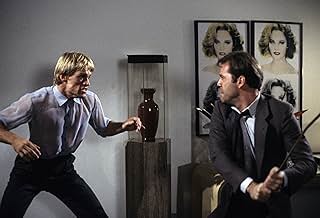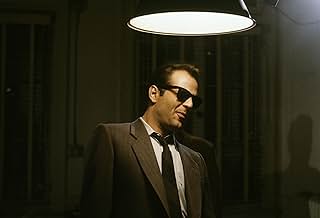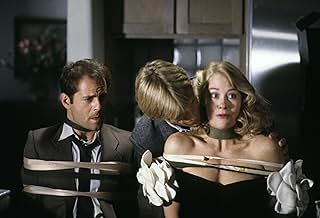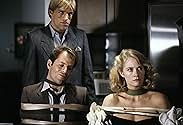Les affaires étranges d'une ancienne mannequin et d'un détective futé, qui gèrent une agence de détective privé.Les affaires étranges d'une ancienne mannequin et d'un détective futé, qui gèrent une agence de détective privé.Les affaires étranges d'une ancienne mannequin et d'un détective futé, qui gèrent une agence de détective privé.
- Récompensé par 6 Primetime Emmys
- 19 victoires et 60 nominations au total
Histoire
Le saviez-vous
- AnecdotesBruce Willis made Piège de cristal (1988) while starring in this show. By the time the series ended, the movie was available on VHS. In one of the last episodes, Willis and a love interest walk past a video rental store while an employee tears a "Die Hard" poster down from the window.
- Citations
Security Officer: I'm sorry, but you're not on the guest list.
David Addison: That's because we're not guests. We're looking for a man with a mole on his nose.
Security Officer: A mole on his nose?
Maddie Hayes: A mole on his nose.
Security Officer: [to Maddie] What kind of clothes?
Maddie Hayes: [to David] What kind of clothes?
David Addison: What kind of clothes do you suppose?
Security Officer: What kind of clothes do I suppose would be worn by a man with a mole on his nose? Who knows?
David Addison: Did I happen to mention, did I bother to disclose, that this man that we're seeking with the mole on his nose? I'm not sure of his clothes or anything else, except he's Chinese, a big clue by itself.
Maddie Hayes: How do you do that?
David Addison: Gotta read a lot of Dr. Seuss.
Security Officer: I'm sorry to say, I'm sad to report, I haven't seen anyone at all of that sort. Not a man who's Chinese with a mole on his nose with some kind of clothes that you can't suppose. So get away from this door and get out of this place, or I'll have to hurt you - put my foot in your face.
- Crédits fousBetween the closing credits of episode 3.9, "The Straight Poop", about 5 minutes of bloopers from previous episodes are shown.
- ConnexionsFeatured in The 37th Annual Primetime Emmy Awards (1985)
By the third episode it was clear they were on to something original, or if not completely original, at least written and executed better than anything else on TV at the time. The Tracy-Hepburn like sparring between Shepherd and unknown actor Bruce Willis, and the sophisticated writing by Caron and the other writers just got better and better as they finished their first half season of ten episodes.
The highlight of that first batch was the celebrated "black and white" episode, "The Dream Sequence Always Rings Twice." In it Maddie and David interview a client who owns a once famous LA nightclub (like the Coconut Grove), which is about to be torn down. There they learn of a mysterious murder that occurred there in the 40's, still unsolved, that revolved around a trumpet player having an affair with the band's married girl singer. The singer's husband was killed and both the trumpet player and the songstress claim the other did the deed. Of course David assumes the woman framed the musician. Maddie feels it was much more likely the sleazy guy did it. Each of them daydream their version of events in 1940's black and white, with Bruce playing the trumpeter and Cybill the singer. Each of their mini-stories works as film noir homage, and the pairing of the two versions come off even stronger. In addition it allowed us to see David and Maddie in a romantic setting without having to put the characters directly into that kind of plot killing situation. The episode won Emmy nominations for everyone involved, including Cybill and Bruce. Bruce won.
Which brings up "the troubles." How many giant egos can one series sustain? Tension began to mount between Shepherd, Willis, and Caron. Cybill was the "star" - but she was essentially playing straight man to Willis. His manic character and split second timing were the force driving the chemistry forward. By the time they were filming the first full season - he was as recognizable as she was. And after years of struggling and starving in New York - he was enjoying every minute of his new found fame.
And then there was Glen Gordon Caron. He was very much a "hands on" producer and had very definite ideas about where he wanted to take the series. His perfectionism frustrated his cast and writers. Several times the crew would begin filming an episode while the writers were still writing. Caron had a commitment to the network for 22 episodes per season. He never delivered more than 20. His shooting regularly went off schedule and over budget. The quality was there on the screen ("Atomic Shakespeare" - a riff on the Taming of the Shrew was practically a movie in and of itself), but the show began to tick off viewers who complained about all the reruns while they waited for a new episode.
As the series moved into its second full season it hit a creative peak:
· The aforementioned Taming of the Shrew
· Big Man on Mulberry Street - with a musical sequence by "Singing in the Rain" director Stanley Donen
· The four Sam and David and Maddie episodes with Mark Harmon as the straight up astronaut whose proposal forces Maddie and David to confront their feelings.
Then it happened. A confluence of events that seemed to drain the show of all its life:
· Maddie and David "did it" - killing off the eternal suspense.
· The writers, tired of all Caron's tirades and very much in demand with all their Moonlighting awards, left the series. Caron had to bring in a fresh crop.
· Cybill Shepherd became pregnant with twins. The timing of the pregnancy would prevent her from filming between September and at least December - a prime production period.
· Glen wrote the pregnancy into the show - and had Maddie flee LA for home - for months. This allowed him to film Shepherd's scenes alone during the summer. Of course with 3000 miles between Maddie and David it's hard to get much zippy chemistry going.
Coming from the creative high of the second season, the letdown in the third year was all the more apparent. By the time they dumped the baby (a miscarriage) at the beginning of the fourth season - the magic was clearly gone. Shepherd and Willis were anxious to move on to more lucrative film projects, and the final season was only a slight improvement over the disappointing previous year.
But, as the nursery rhyme goes - when it was good, it was very very good. In addition to the episodes mentioned above, try to catch some of these on cable:
· "My Fair David" - Maddie bets David can't go through a week without breaking out into some Motown ditty, or making crass sexist comments.
· "Devil in the Blue Dress" with Judd Nelson and Whoopie Goldberg
Meilleurs choix
- How many seasons does Moonlighting have?Alimenté par Alexa
Détails
- Date de sortie
- Pays d’origine
- Langue
- Aussi connu sous le nom de
- Moonlighting
- Lieux de tournage
- ABC Entertainment Center - 2040 Avenue of the Stars, Century City, Los Angeles, Californie, États-Unis(exterior - David & Maddie's detective agency building)
- Sociétés de production
- Voir plus de crédits d'entreprise sur IMDbPro
- Durée45 minutes
- Couleur
Contribuer à cette page























